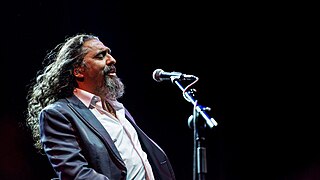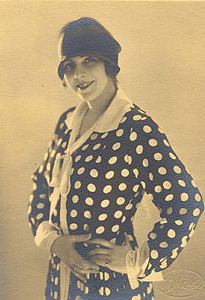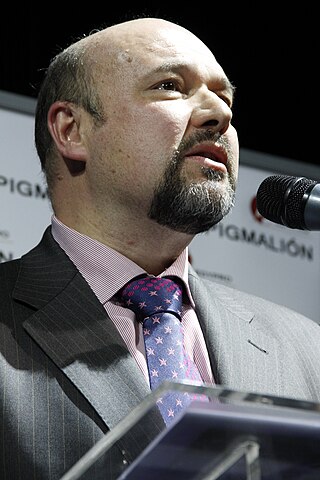Related Research Articles

Infanta Cristina is the younger daughter of King Juan Carlos I and his wife, Queen Sofía. She is sixth in the line of succession to the Spanish throne, after her brother King Felipe VI's children, her sister Infanta Elena, Duchess of Lugo, and Elena's children.
Serafín Álvarez Quintero and Joaquín Álvarez Quintero were Spanish dramatists.

Diego Ramón Jiménez Salazar, known as El Cigala, is a Spanish Romani Flamenco singer. He also holds Dominican citizenship.
Mario Escudero, was one of a handful of Spanish flamenco guitar virtuosos who, following on the footsteps of Ramon Montoya, helped spread flamenco beyond their Spanish homeland when they migrated to the United States in the early 1950s. Along with others such as Sabicas, Carlos Montoya and Juan Serrano, Escudero helped forge the viability of solo flamenco guitar as a concert instrument, with lauded performances at New York's Carnegie Hall, Town Hall, and other venues. Invited to perform at the White House for President John F. Kennedy, Escudero was counted among the best in his era; Ramón Montoya called him "the best flamenco guitarist of this new generation."

Rafael Riqueni del Canto, is a Spanish guitar player and composer. He is considered as one of the biggest names or “Maestros” in flamenco guitar history. At age fourteen, he won the two main national awards for flamenco guitar in Spain. As an adult, he has won the most prestigious flamenco music awards in Spain, including: Premio Andalucía de Cultura, Premio Nacional de la Crítica, Giraldillo a la Maestría de la XVIII Bienal de Flamenco y el Premio AIE. In 2017, he was awarded with XXXI Compás del Cante, this award is always referred to by the Spanish media as the "Flamenco Nobel prize".

Milagros Leal was a Spanish actress.

Teatro Español, formerly Teatro del Príncipe and Corral del Príncipe, is a public theatre administered by the Government of Madrid, Spain. The original location was an open-air theatre in medieval times, where short performances and some theatrical pieces, which became part of famous classical literature in later years, were staged. Its establishment was authorized by a royal decree of Philip II in 1565.

Susana Canales Niaucel was a Spanish film and television actress. Initially a child actor she switched to playing grown-up parts in the early 1950s. She starred in the 1951 drama Black Sky (1951).

Catalina Bárcena (10 December 1888 – 3 August 1978 was a leading Spanish theatre actress during the early decades of the twentieth century. With her partner, Gregorio Martínez Sierra, she worked on the creation of the pioneering Teatro de arte company at Madrid's Teatro Eslava between 1916 and 1926. She subsequently starred with several other high-profile theatre companies and also, during the 1930s, built a Hollywood career as a film actress. In parallel with her acting career she became something of a fashion icon.
Rafael Núñez Florencio is a Spanish historian, philosopher, and critic.

Basilio Rodríguez Cañada is a Spanish writer, editor, poet, professor, columnist, Africanist and cultural manager.
Mar Abascal is a Spanish actress, born in the city of Madrid. She is known for Spanish comedy television series Gym Tony.

Silvia Kal is a Spanish actress and model based in the United States. She has participated in advertising campaigns for brands like Google, Sony and Natura Bissé and has appeared in magazines like GQ, Esquire, Maxim, Vogue and Men's Health. She began her acting career in 2006 participating in the film Goya's Ghosts by Miloš Forman.

Pedro Antonio Giménez Cortés, better known as Antón Jiménez, is a Spanish flamenco guitarist and composer. He began and developed his career playing with Diego el Cigala, and Joaquín Cortés, on their international tours. He received the National Guitar Award in 1995, and is an honorary member of the International Music Council CILM - UNESCO. He also collaborated on the album "The New School Of Flamenco Guitar" nominated for the 2003 Latin Grammy Awards. He has also been a composer for the Ballet Nacional de España and the companies of Lola Greco, Rocío Molina, and Rafael Amargo.

Celia Freijeiro García is a Spanish film, theater and television actress and producer.
Begoña Blasco is a former Spanish rhythmic gymnast. She won the bronze medal with ribbon at the World Championships in Madrid in 1975. That same year she became the first national champion of Spain.
Loreto Valverde Martín is a Spanish actress, singer and television presenter.

Manuel González was a Spanish actor.
Catherine Xaudaró Apellániz is a Spanish former rhythmic gymnast. She won a bronze medal at Worlds in 1975.
Alfredo Fraile Lallana was a Spanish cinematographer and film producer.
References
- ↑ "ABC MADRID 16-09-1928 página 42 - Archivo ABC". abc. 2019-08-07. Retrieved 2023-07-21.
- ↑ "ABC MADRID 12-10-1929 página 40 - Archivo ABC". abc. 2019-08-08. Retrieved 2023-07-21.
- ↑ "ABC MADRID 06-12-1930 página 37 - Archivo ABC". abc. 2019-08-06. Retrieved 2023-07-21.
- ↑ "ABC MADRID 29-04-1933 página 41 - Archivo ABC". abc. 2019-08-05. Retrieved 2023-07-21.
- ↑ "ABC MADRID 13-09-1940 página 7 - Archivo ABC". abc. 2019-08-05. Retrieved 2023-07-21.
- ↑ "ABC MADRID 08-01-1944 página 16 - Archivo ABC". abc. 2019-08-05. Retrieved 2023-07-21.
- ↑ "ABC MADRID 18-11-1959 página 79 - Archivo ABC". abc. 2019-08-07. Retrieved 2023-07-21.
- ↑ "ABC MADRID 22-02-1963 página 63 - Archivo ABC". abc. 2019-08-08. Retrieved 2023-07-21.
- ↑ "Monserrat Blanch - La factura | CDAEM, Teatro Español". www.teatro.es (in Galician). Retrieved 2023-07-21.
- ↑ "ABC MADRID 20-12-1970 página 77 - Archivo ABC". abc. 2019-08-12. Retrieved 2023-07-21.
- ↑ "ABC MADRID 16-12-1971 página 87 - Archivo ABC". abc. 2019-08-13. Retrieved 2023-07-21.
- ↑ "Montserrat Blanch". El País (in Spanish). 1977-06-23. ISSN 1134-6582 . Retrieved 2023-07-21.
- ↑ "Montserrat Blanch - Biografía, mejores películas, series, imágenes y noticias". La Vanguardia (in Spanish). 2022-07-11. Retrieved 2023-07-21.